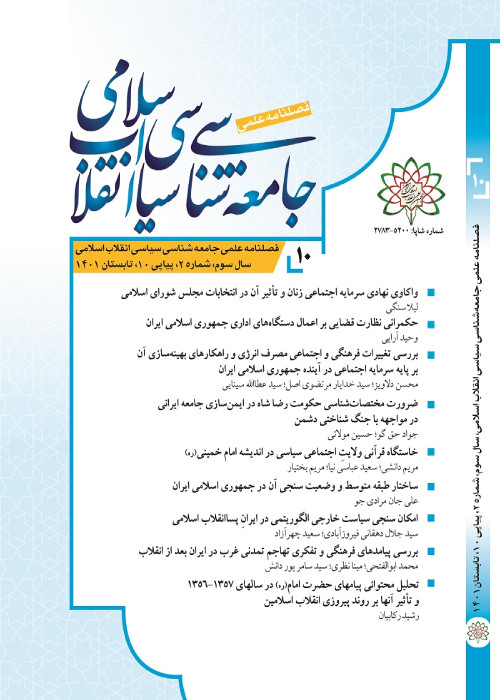Evaluation of People Participation in the Pattern of Iranian Political Culture from the Elites Perspective; Case Study: Citizen of Tehran
Author(s):
Article Type:
Research/Original Article (دارای رتبه معتبر)
Abstract:
The political culture of a society is a set of ideals, attitudes, and more or less fixed attitudes about power and politics, which are formed under the influence of the ideas, symbols, values, and beliefs of individuals and in the context of their history and collective life, and are related to political behaviors and interactions in The existing political system gives directions. The purpose of this research is to measure the political participation of the people in the model of Iran's political culture from the perspective of the elites. The research method in this study is a mixed method (quantitative-qualitative). The statistical population of elites includes 140 professors and political experts of political science faculties of state universities and Islamic Azad and Payam Noor universities of Tehran province, and the population statistical population consists of 704 citizens living in 352 neighborhoods of Tehran. The sampling method in this research is purposeful and completely non-probability. The data collection tool is a researcher-made questionnaire with items taken from library studies and Delphi interviews of experts. The face and content validity of the questionnaire has been confirmed and the reliability of the questionnaire has been emphasized by Cronbach's alpha. Data analysis has been done through descriptive and inferential statistics. According to the findings of this research, the model of Iran's political culture from the perspective of the elites can be presented in three dimensions: macro, medium and micro and western, Iranian, Islamic-revolutionary components, society and governance space, individual and elites and 43 separate indicators. did The results showed that the participation of citizens in the mentioned model is high in many indicators and there is a significant relationship between social bases. Also, there is a significant difference between the attitude of citizens and intellectual elites in the ranking of indicators.
Language:
Persian
Published:
Pazuheshhaye Rahbordi Enghelabe Eslami, Volume:3 Issue: 1, 2022
Pages:
25 to 57
magiran.com/p2503458
دانلود و مطالعه متن این مقاله با یکی از روشهای زیر امکان پذیر است:
اشتراک شخصی
با عضویت و پرداخت آنلاین حق اشتراک یکساله به مبلغ 1,390,000ريال میتوانید 70 عنوان مطلب دانلود کنید!
اشتراک سازمانی
به کتابخانه دانشگاه یا محل کار خود پیشنهاد کنید تا اشتراک سازمانی این پایگاه را برای دسترسی نامحدود همه کاربران به متن مطالب تهیه نمایند!
توجه!
- حق عضویت دریافتی صرف حمایت از نشریات عضو و نگهداری، تکمیل و توسعه مگیران میشود.
- پرداخت حق اشتراک و دانلود مقالات اجازه بازنشر آن در سایر رسانههای چاپی و دیجیتال را به کاربر نمیدهد.
In order to view content subscription is required
Personal subscription
Subscribe magiran.com for 70 € euros via PayPal and download 70 articles during a year.
Organization subscription
Please contact us to subscribe your university or library for unlimited access!




